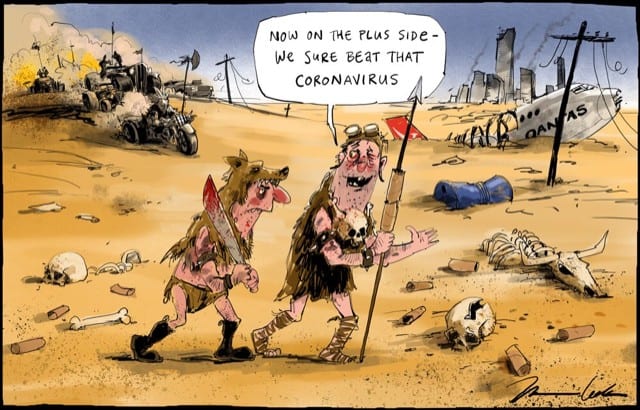
Yelp on Wednesday released its latest Economic Impact Report, revealing business closures across the U.S. are increasing as a result of the coronavirus pandemic’s economic toll.
As of Aug, 31, 163,735 businesses have indicated on Yelp that they have closed. That’s down from the 180,000 that closed at the very beginning of the pandemic. However, it actually shows a 23% increase in the number of closures since mid-July.
In addition to monitoring closed businesses, Yelp also takes into account the businesses whose closures have become permanent. That number has steadily increased throughout the past six months, now reaching 97,966, representing 60% of closed businesses that won’t be reopening. [The 60% is misleading because others have meanwhile re-opened. Relative to the 180K that closed in March the 98K is 55%.]
“Overall, Yelp’s data shows that business closures have continued to rise with a 34% increase in permanent closures since our last report in mid-July,” Justin Norman, vice president of data science at Yelp, told CNBC.

Yelp’s September report marks six months since March 1, the date that the company considers to be the beginning of the business crisis.
In order to gather closure data, Yelp monitors changes in business hours or descriptions on its app, offering an immediate, localized view of the impact the pandemic has had on small businesses.
“Despite the hard hit small businesses have certainly taken, we’ve seen that home, local, professional and automotive services have been able to withstand the effects of the pandemic better than other industries,” Norman noted.

The data supports the trend that most consumers are choosing to stay home over patronizing establishments physically, as home and professional services such as landscapers, contractors and lawyers, see a much lower closure rate than clothing stores and even home decor businesses. Auto and towing services also reported a relatively low closure rate.
“Consumers still need these services,” Norman said. “Through the rise of virtual consultations, and contactless or socially distanced services, these businesses have been particularly resilient during this time.”
Throughout the past six months, restaurants, bars and nightlife venues have been hit the hardest by the restrictions brought by the pandemic: 32,109 restaurants have closed, as of Aug. 31. The number of restaurants forced to permanently close is slightly above Yelp’s total average, at 61%.

Yelp has also noted that businesses already well suited for takeout, such as pizza places, coffee shops and delis, are treading water better than other restaurants. The types of restaurants with the highest closures include breakfast and brunch places, sandwich shops, and Mexican restaurants.
Norman noted that policy changes in the coming weeks and months could have an impact on whether these closures turn permanent. “The continued rollout of indoor dining, especially in metros like New York City, will be worth watching as it will be critical for businesses to maintain the right balance of practicing social distancing and other responsible safety measures to ensure they can stay open.”
Bars and nightlife venues have also seen a large impact from the pandemic, as a business that can’t adapt as easily to outdoor dining or takeout. Despite being a sector that is six times smaller than restaurants, 6,451 venues have closed. The rate of permanent closures has increased 10% since July, now sitting at 54%.
Retail saw a similar increase in permanent closures since July, rising 10% to a total of 58% indicated permanent. That’s out of 30,374 closed retail businesses.
The report showed a surprising month-over-month rise in permanent closures for beauty businesses — since July, about 42% more businesses were indicated as permanently closed. Total closures for the beauty industry sit at 16,585, which is a 22% increase since July.
Different states are also facing varying degrees of closures, and perhaps unsurprisingly, Yelp sees a correlation between states with a high number of closures and states with a high unemployment rate. Looking at closures per 1,000 for each state, Hawaii has been hit the hardest, followed by California, Nevada, Arizona and Washington state. Hawaii’s unemployment rate sat at 13% in July, and the state also relies heavily on tourism.
“Due to the pandemic, these states were greatly impacted by travel restrictions and also face high rates of unemployment,” said Norman. “These states are also home to the hardest-hit metros including Las Vegas, Honolulu and several of the largest California urban areas like San Diego, San Francisco, San Jose and Los Angeles.”

Yelp has also noted discrepancies between large cities, where closures are higher and businesses are not faring as well, and smaller areas, which have proved more forgiving to small business. Los Angeles and New York report the highest number of closures: Los Angeles has seen 15,000 closures, half of which are permanent, and New York has seen more than 11,000 closures, with the high rate of 63% reported as permanent.
“Meanwhile, we’re actually seeing larger metros with fewer closures in the East, including Pittsburgh, Philadelphia, and Baltimore,” Norman noted.
Ultimately, Yelp’s data shows that Main Street is still feeling the economic impact of the pandemic, and many states and areas of business may not see a recovery soon.
“While it’s hard to say when we can expect business closures to stabilize, we’ve continued to see businesses successfully adapt to these uncertain times over the last six months thanks to their own hard work, innovation and local policy changes,” Norman said.
Source: CNBC
Disclaimer: We at Prepare for Change (PFC) bring you information that is not offered by the mainstream news, and therefore may seem controversial. The opinions, views, statements, and/or information we present are not necessarily promoted, endorsed, espoused, or agreed to by Prepare for Change, its leadership Council, members, those who work with PFC, or those who read its content. However, they are hopefully provocative. Please use discernment! Use logical thinking, your own intuition and your own connection with Source, Spirit and Natural Laws to help you determine what is true and what is not. By sharing information and seeding dialogue, it is our goal to raise consciousness and awareness of higher truths to free us from enslavement of the matrix in this material realm.
 EN
EN FR
FR


























We have to take advantage of this opportunity to create new, viable, appropriate, sustainable businesses. You have to admit, most of the clothing stores sell schlock. Amazon and Walmart have been testing drone deliveries and rec’d clearance to expand. Their distribution centers will spread like chicken pox as a the range is one mile.
I feel we need to walk away from plastics, petroleum based clothing and other products and walk our own paths, grow good, make clothes, make things and embrace simplicity. These changes are not finished and the landscape will look very different in 4 years (nothing to do w/ politics) Good things are happening, we have to remain positive, gentle and compassionate.
grow food:)
Yes, because of the shutdowns: alot of businesses have closed down & not reopening. Example: Banana Republic clorhing store in Park Meadows mall in Denver, Colorado has not reopened & the other Banana Republic clothing store at Cherry Creek mall in Denver, Colorado. Sounds like the Thanksgiving & Christmas holidays will be different this year ???? Not much Christmas shopping ???